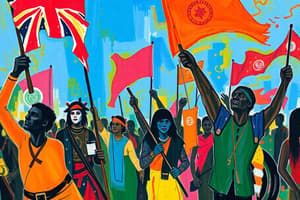Podcast
Questions and Answers
Who founded the Indian National Congress?
Who founded the Indian National Congress?
- Jawaharlal Nehru
- Allan Octavian Hume (correct)
- Mahatma Gandhi
- Subhas Chandra Bose
Which movement led by Mahatma Gandhi emphasized non-violent civil resistance?
Which movement led by Mahatma Gandhi emphasized non-violent civil resistance?
- Quit India Movement
- Revolt of 1857
- Non-cooperation Movement (correct)
- Cabinet Mission Plan
During which years did the Non-cooperation Movement take place?
During which years did the Non-cooperation Movement take place?
- 1905-1907
- 1930-1934
- 1920-1922 (correct)
- 1919-1920
What was the primary goal of the Indian independence movement?
What was the primary goal of the Indian independence movement?
Which ideology did Mahatma Gandhi emphasize in his leadership during the independence movement?
Which ideology did Mahatma Gandhi emphasize in his leadership during the independence movement?
Who played a pivotal role in unifying India during the Non-cooperation Movement?
Who played a pivotal role in unifying India during the Non-cooperation Movement?
What was the main goal of the Non-cooperation movement in India?
What was the main goal of the Non-cooperation movement in India?
Which organization played a central role in leading the Indian independence movement?
Which organization played a central role in leading the Indian independence movement?
How did the Indian National Congress evolve over time?
How did the Indian National Congress evolve over time?
What was a significant outcome of the partition of India in 1947?
What was a significant outcome of the partition of India in 1947?
How did Mahatma Gandhi impact the Indian independence movement?
How did Mahatma Gandhi impact the Indian independence movement?
What effect did the Non-cooperation movement have on Indian unity?
What effect did the Non-cooperation movement have on Indian unity?
Flashcards are hidden until you start studying
Study Notes
Nationalism in India: A Historical Overview
The journey of nationalism in India began as a response to British colonial rule and eventually led to the country's independence and the formation of a unified nation-state. This article explores the evolution of Indian nationalism, focusing on key milestones and figures that shaped this transformational era.
Indian Independence Movement
Indian nationalism took root as a response to foreign rule, with the Indian independence movement, also known as the freedom struggle, encompassing a multifaceted and prolonged effort to end British colonialism. The movement was driven by a diverse array of ideologies, from moderate constitutional reform to radical social and political transformation. The Indian National Congress, founded in 1885, emerged as the primary organization leading the struggle.
Role of Mahatma Gandhi
Mahatma Gandhi, a pivotal figure in Indian nationalism, utilized non-violent civil resistance to challenge British rule. His philosophies of non-violence, self-sufficiency, and inclusivity deeply impacted the Indian independence movement. Gandhi's leadership, particularly during the Non-cooperation movement (1920-1922), was instrumental in unifying the diverse Indian populace and garnering international support for Indian independence.
Non-cooperation Movement
The Non-cooperation movement, launched by Gandhi, was the first mass-participation campaign aimed at freeing India from British rule. The movement encouraged Indians to stop cooperating with the British authorities and to produce their own textiles, boycott British goods, and withdraw from government schools and offices. The Non-cooperation movement acted as a catalyst in bringing a sense of unity to the Indian independence movement.
Indian National Congress
The Indian National Congress, founded in 1885 by Indian lawyers and intellectuals, became the primary organization leading the Indian independence movement. Initially, the Congress focused on securing constitutional reforms and greater representation for Indians in the British administration. Over time, it evolved into a nationwide organization that sought to end British rule and establish an independent Indian nation-state.
Partition of India
The partition of India in 1947, a controversial decision made by British authorities to divide India into two independent nations — India and Pakistan — greatly influenced the aftermath of the Indian independence movement. The partition resulted in the displacement of millions of people, widespread violence, and the establishment of a highly contentious relationship between the newly formed nations.
Nationalism in India has profoundly shaped the country's history and continues to influence its present. As a nation, India has a richly pluralistic heritage, with its national identity being constructed from a diverse array of cultural, religious, and linguistic traditions. The legacy of Indian nationalism serves as a constant reminder of the country's complex and often tumultuous past, fostering a sense of national pride and unity among its citizens.
Studying That Suits You
Use AI to generate personalized quizzes and flashcards to suit your learning preferences.




